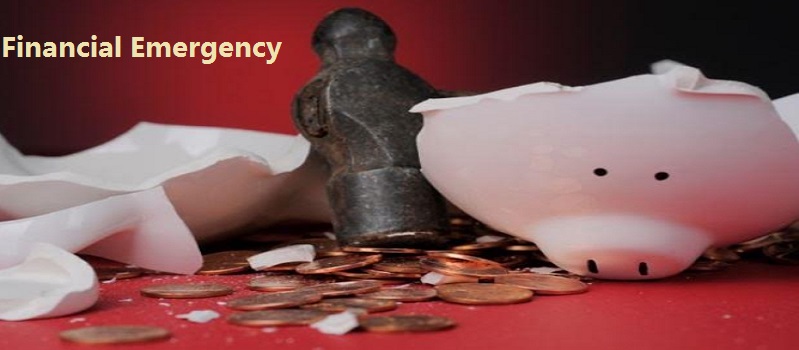Waiting for the financial crisis to arrange funds and begin saving is a bad idea. Instead, start planning to tackle any sort of emergencies beforehand, whether they are likely to arise or not.
‘Emergency’ the word is itself so nerve-racking. Imagine if it arises in your life in any form. Ask yourself what you need to do? Do you have enough savings to manage it? Do you even have extra funds for a financial emergency?
Suppose you don’t have or not confident about the answers to these questions. Then it is the right time to begin thinking along these lines.
The pandemic has given us a reality check about our finances and has shown that no person in this world is immune to crises.
Many people have and already facing challenges when an unexpected emergency knocks on their door. Mainly they apply for quick loans in Irelandto manage the after-effect. But many get flooded with uncontrollable emotions and lose self-control.
Therefore protecting yourself from such emergency crunches is the need of the hour. Instead of panicking when it happens, take steps to build an unshakable emergency fund before its arrival.
How to create a solid emergency fund to meet any financial difficulties?
Any financial emergency can hit your hard-earned money and bring it down to zero in no time. This not only harms your mental wellbeing but is fully capable of making your money sore.
Emergencies like loss of job, unavoidable home repair, car breaking down, and medical costs warrant your immediate action. If you don’t want to drain your current savings, follow the feasible practices below to build a sturdy emergency fund.
1. Begin with saving goals
Without a saving goal, you will not achieve your monetary objectives. Try to keep it realistic and consistent. Plan to save by percentage or euros. Either fix a percentage that goes straight to your savings or a specific amount.
Commit to yourself that you will deposit at least 20% of your income to your emergency savings each month.
2. Cut back on unessential
Now you have a goal. You will now reevaluate your purchases ranging from biggest to smallest. Every spending detail should be analyzed. If you see that you are buying things that are not essential, then avoid purchasing them from now.
You should ultimately focus on making a bulky emergency fund. Once you accomplish your goal of creating a firm money cushion for yourself, then you can start repurchasing those flashy magazines.
3. Build a practical budget
The process of budgeting can be boring for many, but creating it is a vital step in building an emergency fund. It shows a clear picture of your income and expenditure. You will get to know where you will tighten the wallet string.
You can utilise a budgeting app to monitor all your monthly inflows and outflows. Follow a 50-30-20 rule where 50% of your income goes towards meeting essentials like groceries, transport, bills, mortgage or rent payment.
Then 30% goes for emergency funds, clearing off debts, and retirement savings. Now the remaining 20% can be used for amusement and cafe meals.
4. Lower the debts
In order to save maximum money each month, you have to pay off your debts coming from every source except the long-term mortgage. Debts eat up a significant ratio of your income which can be used for growing your emergency funds.
There are several techniques to clear off debts, and the most popular ones are avalanche and snowball.
If you are comfortable paying the smallest debts first, then pick the snowball method. If you want to get rid of the debts having the highest interest rate, then avalanche is the right pick.
Or else, you can also use a loan from money lenders in Ireland to get rid of all your ongoing debts in one shot.
5. Upgrade car insurance
You need to revive your current vehicle insurance. If it doesn’t provide coverage when you accidentally injure or damage someone else car. Then it is a good idea to do it now.
Many insurance agencies cover the damages partially. Pick that plan that gives comprehensive protection from all the likely damages and accidents in the future.
6. Pump up your income
Consider taking a part-time job that offers decent pay. You can use the money from a side hustle to boost your emergency fund.
Pick a job that matches your experience, skills, and interest if you get paid decently for the type of work you like. Then it will act as a lifesaver during emergencies.
7. Maximize medical coverages
If you already possess medical insurance, you should aim to maximise its coverage. Many insurance policies cover only the price of the prescribed drugs and exclude doctor consulting charges.
Make sure you take coverage that includes all the requisites which you will require in a medical emergency. This will save up a lot during such emergencies.
To conclude
When an individual faces a hard-hitting financial emergency, it takes a lot of time to rebuild life and make it the way it was before the crisis mode.
Ethically every person should have substantial emergency funds. But due to many unavoidable expenses, they fail to save money in the first place and building a reserve seems impossible for them. As a result, many apply for quick loans in Ireland whenever they face a financial crunch.
But every financial expert recommends creating an emergency fund. We advise our readers to have funds that can cover the cost of your living for 3-6 months.
Whenever you face an emergency and you have very few funds to cover the cost. Then you should not panic but rather move forward with a practical money plan.
Promise yourself that you will start building your funds and strengthen your finances with the right approach. You are well aware of the significance of having corpus aside for meeting emergencies. So why not start it from today.
Remember that it is never too late to start something that is beneficial for your being.

Caleb works as a senior content writer at Financealoan for the past 3 years. He is a writing enthusiast and invests a good time in exploring and writing about financial trends. His keenness in exploring a topic to create a research-based piece is simply unmatched. He believes in including a texture of authenticity with real-time examples and facts.
Caleb’s blogs and articles reveal deep-seated knowledge and expertise. His educational qualification forms the base of his excellent command over the industry and Jargon. He is a postgraduate in Finance and is currently involved in exploring the world of the stock market.






